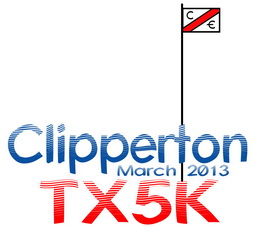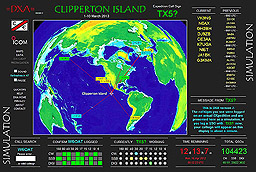|
We are pleased to announce... |
|
|
Standards The 2013 Clipperton DXpedition and the QSLing activity following the DXpedition will be carried out in accordance with the Policies of the DXCC Program. The requirements for accreditation of a DXpedition are available on the ARRL website: http://www.arrl.org/rules (SECTION III).
About DXA and the green squares: The DXpedition will make use of the innovative real-time website DXA to provide DXers with selected information about the operation. DXA shows information extracted from the log for display in near real time (every minute or so), as a convenience for the DXer and as a means of sharing the excitement of the operation. However, the display on DXA is NOT the DXpedition log. We will not QSL using the information shown on DXA, but rather using the original (certified) DXpedition log. However, if you made a valid QSO and you can see your green square on DXA, you can be effectively guaranteed that you are safely in the log for that bandmode. During the operation or after it has gone QRT, we invite you to open the DXA window and log in with your callsign. If the green squares, which indicate your log entries, do not agree with your log, you may write to KK6EK@cordell.org. Note that we cannot change the log based on your request; all we can do is fix the green squares if they do not accurately represent the DXpedition log. However, if you can present a convincing case that the DXpedition incorrectly entered your call, the QSL manager will consider all the facts and make a judgment on whether the QSO was valid. The QSL manager is the final authority on all such issues. DXA and cheating: During the initial development and deployment of DXA (Kure Atoll K7C 2005), the ARRL was extremely concerned whether DXA would enable, and therefore encourage, cheating. For instance, if you saw a QSO on DXA that closely matched your callsign, would you be able to (dishonestly) claim that you made this QSO? The answer is almost certainly "no". The reason is that DXA records a great deal of information that is not displayed on the DXA window. In several cases on the 2005 K7C operation, a DXer claimed to have made a QSO that was not subsequently found in the log. Unfortunately for this DXer, we were able to do a forensic analysis of the DXA records, which showed unquivocally that he could not have made the QSO as claimed. It is our belief that the number of DXers who would wish to cheat the system is negligibly small, but be warned--if you are tempted to cheat, almost certainly you will be embarrassed, and worse, not receive a QSL for your QSOs. |
||||
|
||||
Copyright © 2013 Robert W. Schmieder All rights reseved. Last update:
|


